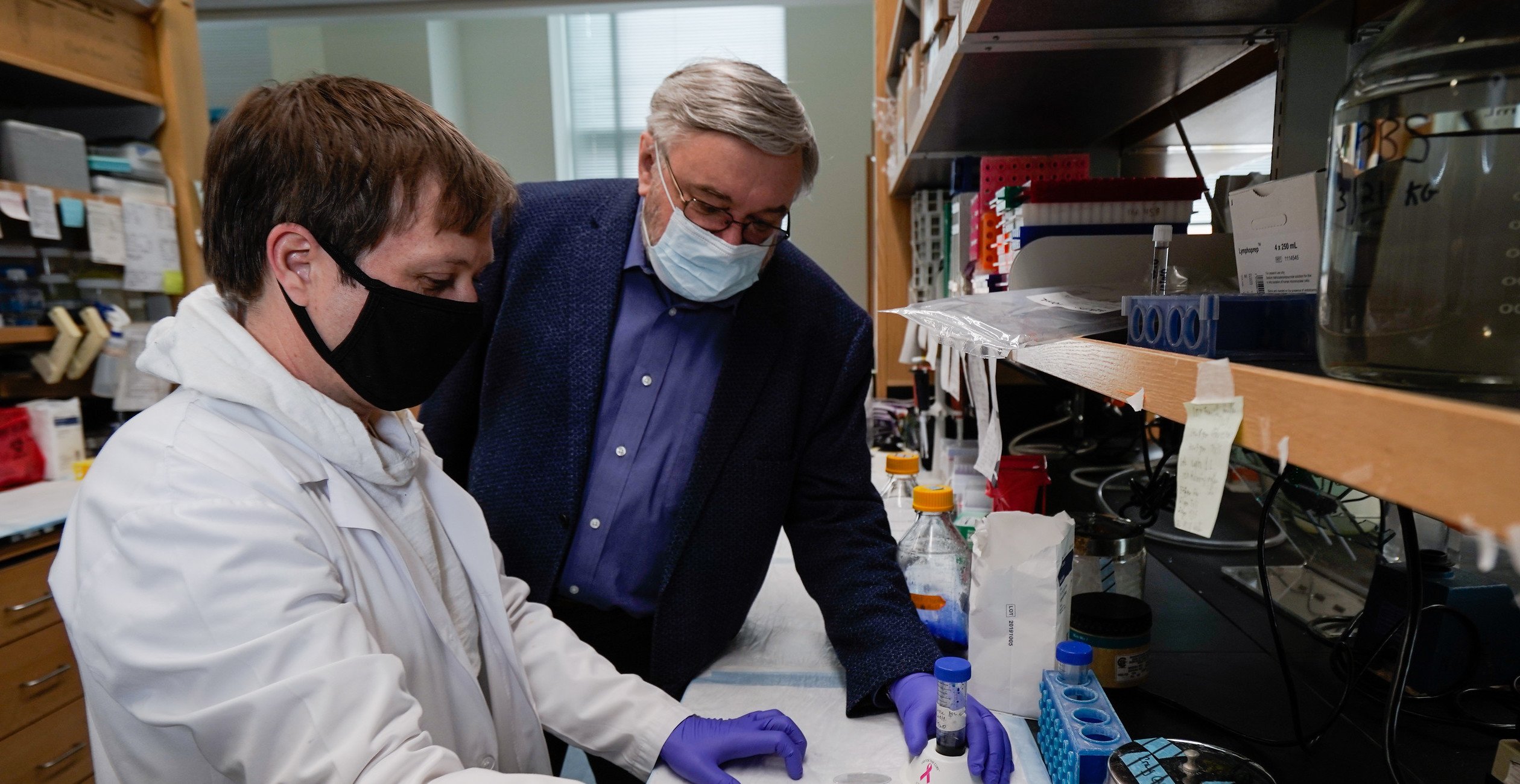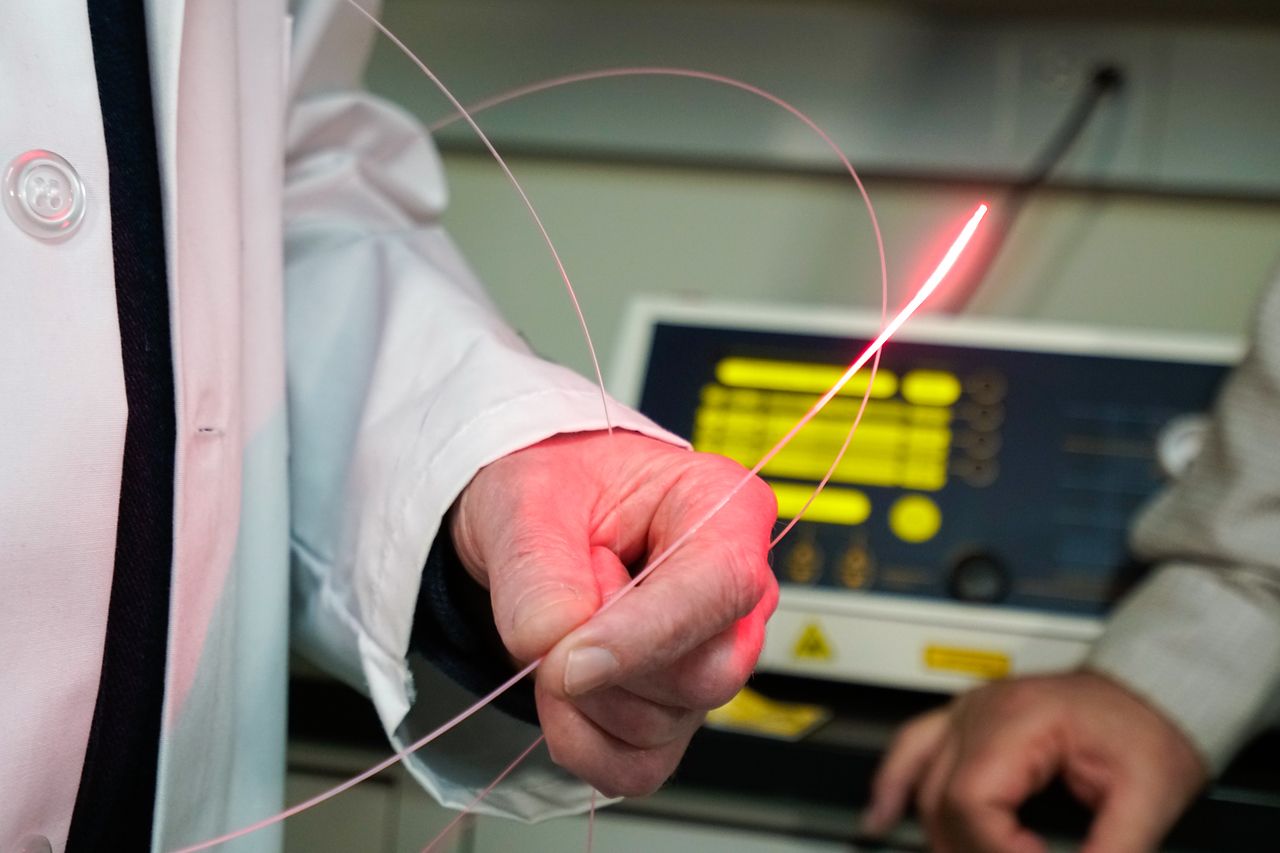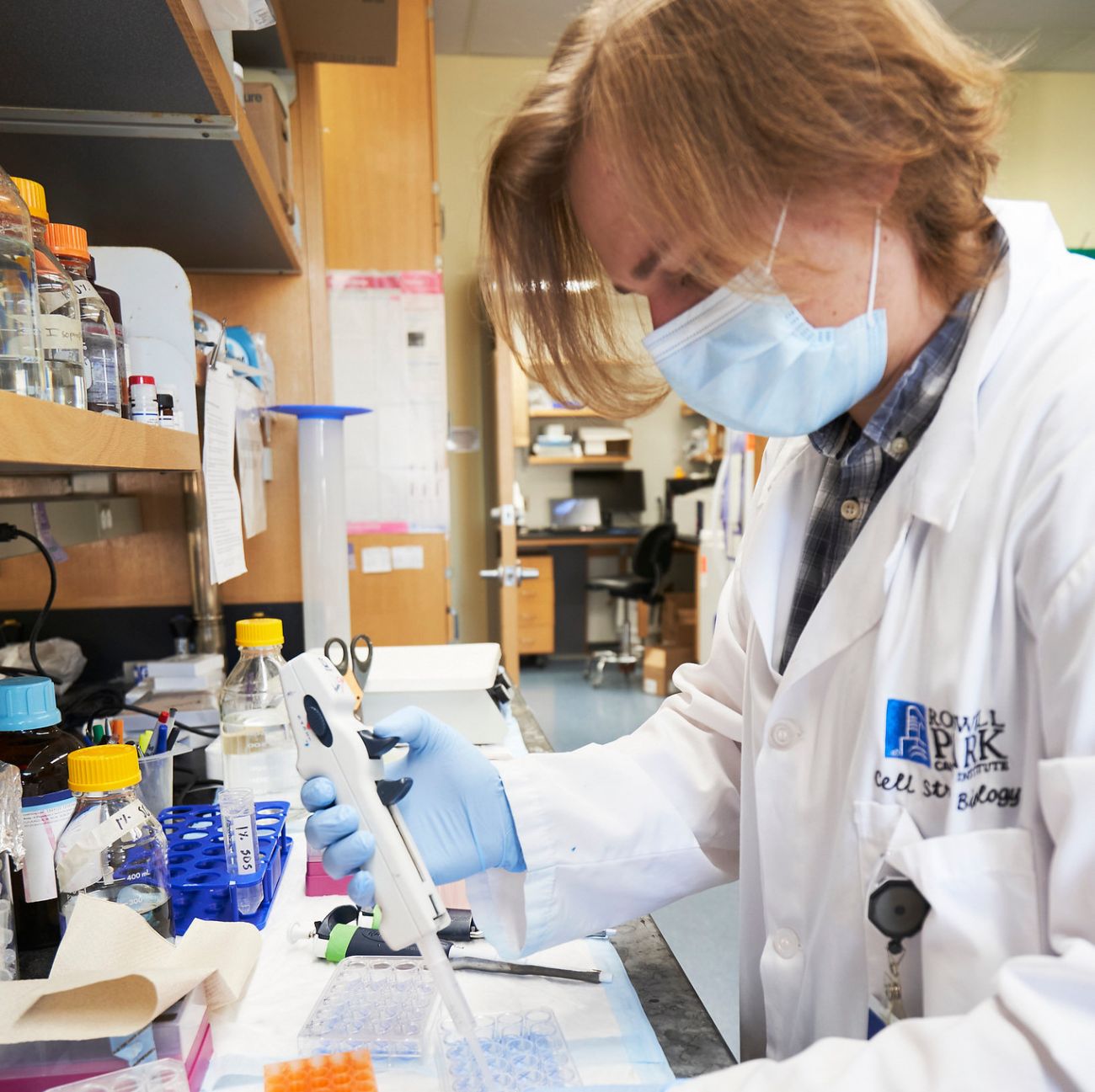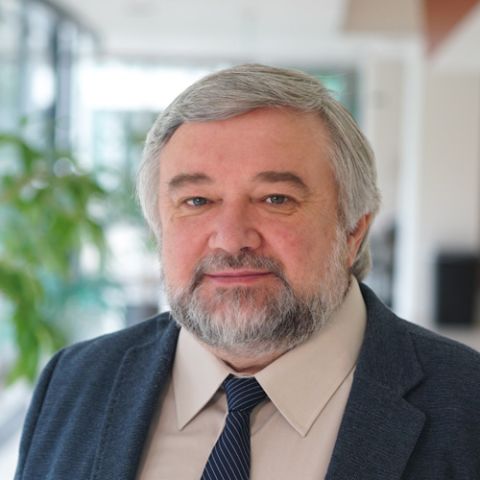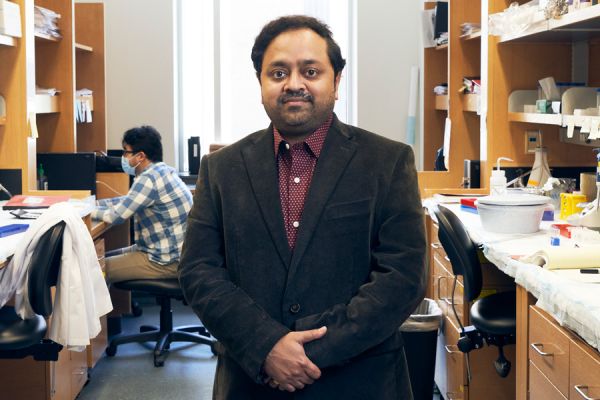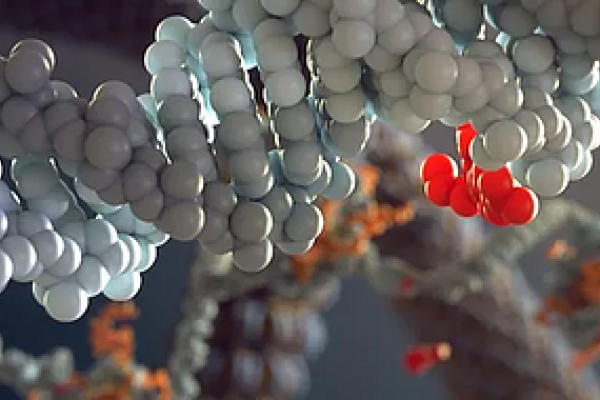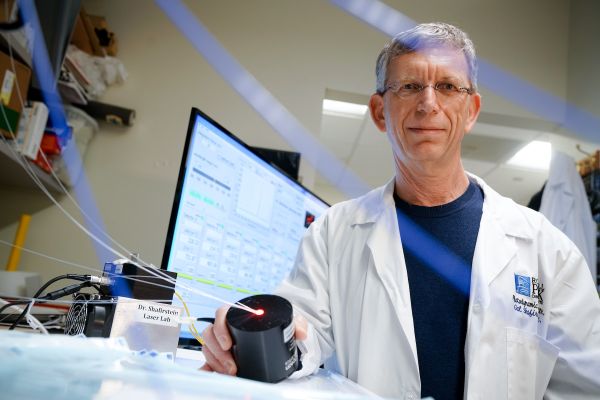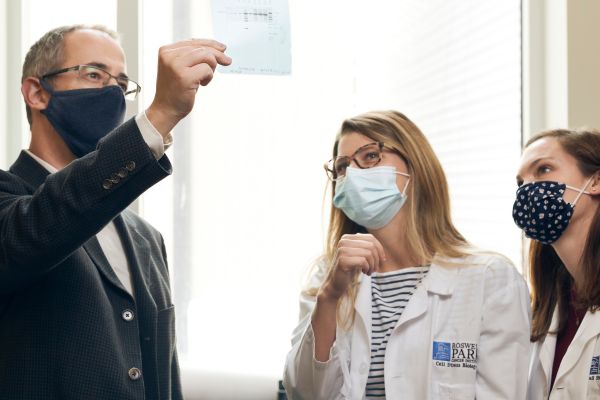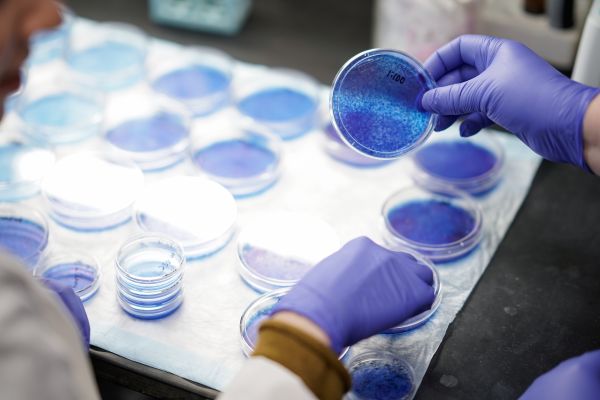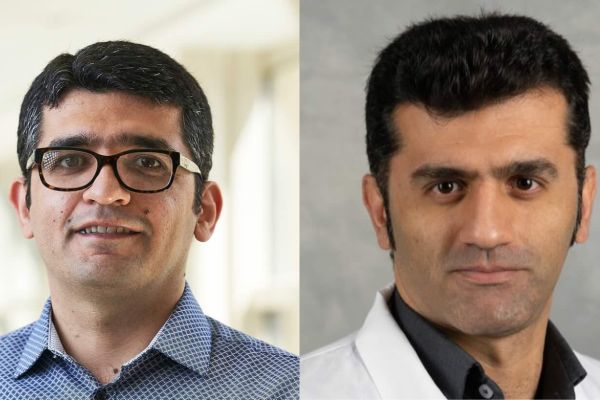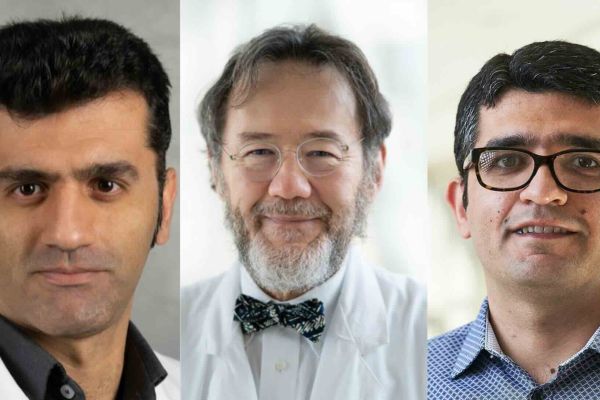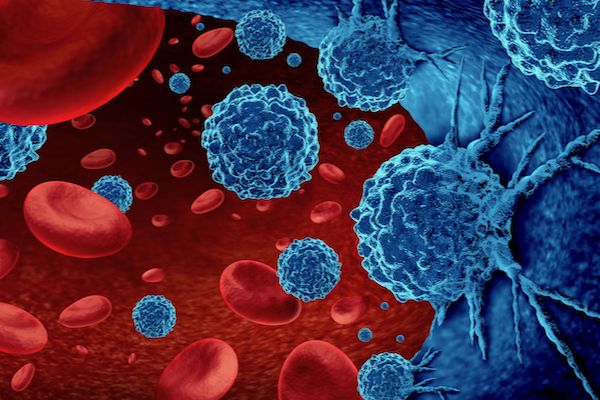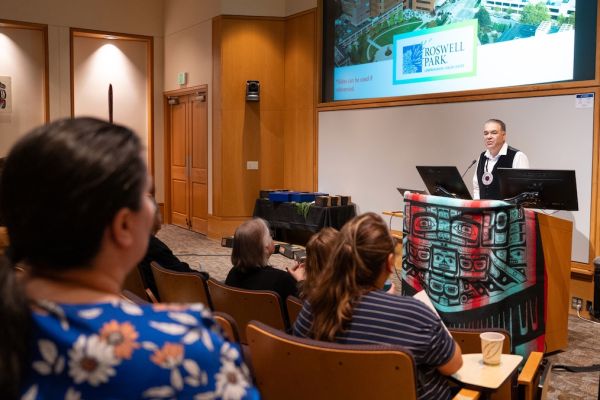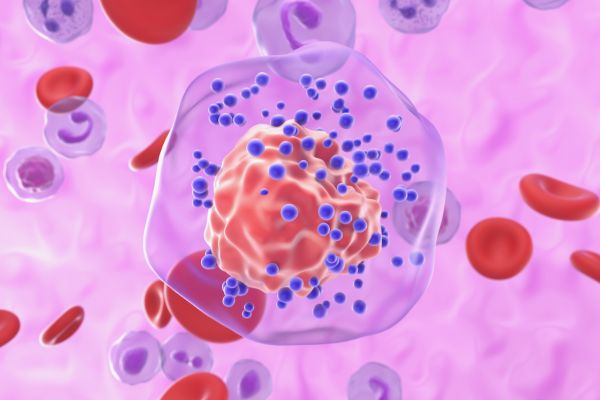Using light and heat in clinical cancer therapies
The Department of Cell Stress Biology at Roswell Park studies the exploitation of cellular stress, especially oxidative and thermal stress, as a target mechanism of clinical therapies.
1st
Photodynamic therapy center in the world
12
Major research labs
What we do
- Define molecular and cellular stress mechanisms that might be exploited to aid in diagnosis or treatment of malignant disease;
- Develop novel cancer treatment strategies based on these mechanisms;
- Bring treatments to clinical fruition by facilitating interactions with clinicians and basic scientists; and
- Provide a training ground for these novel treatment approaches.
Our highly multidisciplinary team has expertise in chemistry, biochemistry, biophysics, biology, molecular biology, immunology and numerous clinical disciplines.
Spotlight: Photodynamic Therapy Center
Photodynamic therapy (PDT) was developed at Roswell Park, and our PDT Center is a worldwide leader in its use for treating many types of cancer.
Oxidative Stress Group
Oxidative stress is implicated in the etiology of many human diseases, including cancer. It is also the mechanism by which cancer treatment modalities, such as radiation therapy or photodynamic therapy, exert their anti-tumor effects.
Through the study of signal transduction, cell cycle regulation, apoptosis, mitochondrial and/or nuclear DNA damage, mitochondrial dysfunction and genetic instability, the Oxidative Stress Group concentrates on the role of reactive oxygen species (ROS), generated during oxidative stress, in the activation of oncogenic pathways and the response of cancer cells to specific stress environments.
Thermal Stress Group
Another physiologically relevant stress is the thermal response accompanying a natural fever and the heat shock proteins that are associated with an elevation in body temperature.
The Thermal Stress Group focuses on the interactions among heat shock proteins, the thermal element of fever and the immune response, with the major goal of developing heat shock protein cancer vaccines as well as other thermally activated adjuvants.
Spotlight: Cancer Stress Biology Research Program
How can we use the principles of biophysics – like heat and light – to treat cancer? The Cancer Stress Biology Research Program at Roswell Park is determined to find out.
Unmatched expertise
Specializing in: DNA damage and repair, photodynamic therapy, thermal and hypoxic stress and immune modulation.
Research interests: Drug discovery approaches; gene discovery; molecular targets for cancer treatment.
See the science
Recent publications
- Nikolai BC, Jain P, Cardenas DL, York B, Feng Q, McKenna NJ, Dasgupta S, Lonard DM, O'Malley BW. Steroid receptor coactivator 3 (SRC-3/AIB1) is enriched and functional in mouse and human Tregs. Sci Rep. 2021 Feb 9;11(1):3441. doi: 10.1038/s41598-021-82945-3. PubMed PMID: 33564037; PubMed Central PMCID: PMC7873281.
- Damasco JA, Ohulchanskyy TY, Mahajan S, Chen G, Singh A, Kutscher HL, Huang H, Turowski SG, Spernyak JA, Singh AK, Lovell JF, Seshadri M, Prasad PN. Excretable, ultrasmall hexagonal NaGdF4:Yb50% nanoparticles for bimodal imaging and radiosensitization. Cancer Nanotechnol. 2021;12(1):4. doi: 10.1186/s12645-021-00075-x. Epub 2021 Feb 5.
- Anandakrishnan N, Ye H, Guo Z, Chen Z, Mentkowski KI, Lang JK, Rajabian N, Andreadis ST, Ma Z, Spernyak JA, Lovell JF, Wang D, Xia J, Zhou C, Zhao R. Fast Stereolithography Printing of Large-Scale Biocompatible Hydrogel Models. Adv Healthc Mater. 2021 Feb 15:e2002103. doi:10.1002/adhm.202002103. PMID: 33586366
- Sawant Dessai A, Dominguez MP, Chen UI, Hasper J, Prechtl C, Yu C, Katsuta E, Dai T, Zhu B, Jung SY, Putluri N, Takabe K, Zhang XH, O'Malley BW, Dasgupta S. Transcriptional Repression of SIRT3 Potentiates Mitochondrial Aconitase Activation to Drive Aggressive Prostate Cancer to the Bone. Cancer Res. 2021 Jan 1;81(1):50-63. doi: 10.1158/0008-5472.CAN-20-1708. Epub 2020 Oct 28. PMID: 33115805; PMCID: PMC787833.
- Long MD, Jacobi JJ, Singh PK, Llimos G, Wani SA, Rowsam AM, Rosario SR, Hoogstraat M, Linder S, Kirk J, Affronti HC, Bergman A, Zwart W, Campbell MJ, Smiraglia DJ. Reduced NCOR2 expression accelerates androgen deprivation therapy failure in prostate cancer. Cell Reports 37, 110109 doi.org/10.1016/j.celrep.2021.110109
- Korotchkina L, Kazyulkin D, Komarov PG, Polinsky A, Andrianova EL, Joshi S, Gupta M, Vujcic S, Kononov E, Toshkov I, Tian Y, Krasnov P, Chernov MV, Veith J, Antoch MP, Middlemiss S, Somers K, Lock RB, Norris MD, Henderson MJ, Haber M, Chernova OB, Gudkov AV. OT-82, a novel anticancer drug candidate that targets the strong dependence of hematological malignancies on NAD biosynthesis. Leukemia. 2020 Jul;34(7):1828-1839. doi: 10.1038/s41375-019-0692-5. Epub 2020 Jan 2. PubMed PMID: 31896781; PubMed Central PMCID: PMC7326709.
- Borah BM, Cacaccio J, Durrani FA, Bshara W, Turowski SG, Spernyak JA, Pandey RK. Sonodynamic therapy in combination with photodynamic therapy shows enhanced long-term cure of brain tumor. Sci Rep. 2020 Dec 11;10(1):21791. doi: 10.1038/s41598-020-78153-0. PMID: 33311561
- Zhang S, Cheruku RR, Dukh M, Tabaczynski W, Patel NJ, White WH 3rd, Missert JR, Spernyak JA, Pandey RK. The Structures of Gd(III) Chelates Conjugated at the Periphery of 3-(1'-Hexyloxy)ethyl-3-devinylpyropheophorbide-a (HPPH) Have a Significant Impact on the Imaging and Therapy of Cancer. ChemMedChem. 2020 Nov 4;15(21):2058-2070. doi: 10.1002/cmdc.202000449. Epub 2020 Oct 14. PMID: 32916033; PMCID: PMC7722155.
- Chamberlain S, Bellnier D, Yendamuri S, Lindenmann J, Demmy T, Nwogu C, Ramer M, Tworek L, Oakley E, Mallory M, Carlsen L, Sexton S, Curtin L, Shafirstein G. An Optical Surface Applicator for Intraoperative Photodynamic Therapy. Lasers Surg Med. 2020 Jul;52(6):523-529. doi: 10.1002/lsm.23168. Epub 2019 Oct 6. PubMed PMID: 31587314; PubMed Central PMCID: PMC7131890.
- Oakley E, Bellnier D, Hutson A, Cooper H, Habitzruther M, Sexton S, Curtin L, Tworek L, Mallory M, Henderson B, Shafirstein G. Irradiance, Photofrin® Dose and Initial Tumor Volume are Key Predictors of Response to Interstitial Photodynamic Therapy of Locally Advanced Cancers in Translational Models. Photochem Photobiol. 2020 Mar;96(2):397-404. doi: 10.1111/php.13207. Epub 2020 Feb 18. PubMed PMID: 31887227; PubMed Central PMCID: PMC7138700.
- Antoch MP, Wrobel M, Gillard B, Kuropatwinski KK, Toshkov I, Gleiberman AS, Karasik E, Moser MT, Foster BA, Andrianova EL, Chernova OV, Gudkov AV. Superior cancer preventive efficacy of low versus high dose of mTOR inhibitor in a mouse model of prostate cancer. Oncotarget. 2020 Apr 14;11(15):1373-1387. doi: 10.18632/oncotarget.27550. eCollection 2020 Apr 14. PubMed PMID: 32341756; PubMed Central PMCID: PMC7170500.
- Somers K, Evans K, Cheung L, Karsa M, Pritchard T, Kosciolek A, Bongers A, El-Ayoubi A, Forgham H, Middlemiss S, Mayoh C, Jones L, Gupta M, Kees UR, Chernova O, Korotchkina L, Gudkov AV, Erickson SW, Teicher B, Smith MA, Norris MD, Haber M, Lock RB, Henderson MJ. Effective targeting of NAMPT in patient-derived xenograft models of high-risk pediatric acute lymphoblastic leukemia. Leukemia. 2020 Jun;34(6):1524-1539. doi: 10.1038/s41375-019-0683-6. Epub 2019 Dec 17. PubMed PMID: 31848452.
- Eremina NV, Kazey VI, Mishugin SV, Leonenkov RV, Pushkar DY, Mett VL, Gudkov AV. First-in-human study of anticancer immunotherapy drug candidate mobilan: safety, pharmacokinetics and pharmacodynamics in prostate cancer patients. Oncotarget. 2020 Apr 7;11(14):1273-1288. doi: 10.18632/oncotarget.27549. eCollection 2020 Apr 7. PMID: 32292576; PMCID: PMC7147088.
- Haderski GJ, Kandar BM, Brackett CM, Toshkov IM, Johnson CP, Paszkiewicz GM, Natarajan V, Gleiberman AS, Gudkov AV, Burdelya LG. TLR5 agonist entolimod reduces the adverse toxicity of TNF while preserving its antitumor effects. PLoS One. 2020;15(2):e0227940. doi: 10.1371/journal.pone.0227940. eCollection 2020. PubMed PMID: 32027657; PubMed Central PMCID: PMC7004342.
- Antoch MP, Wrobel M, Gillard B, Kuropatwinski KK, Toshkov I, Gleiberman AS, Karasik E, Moser MT, Foster BA, Andrianova EL, Chernova OV, Gudkov AV. Superior cancer preventive efficacy of low versus high dose of mTOR inhibitor in a mouse model of prostate cancer. Oncotarget. 2020 Apr 14;11(15):1373-1387. doi: 10.18632/oncotarget.27550. eCollection 2020 Apr 14. PubMed PMID: 32341756; PubMed Central PMCID: PMC7170500.
- Babagana M, Kichina JV, Slabodkin H, Johnson S, Maslov A, Brown L, Attwood K, Nikiforov MA, Kandel ES. The role of polo-like kinase 3 in the response of BRAF-mutant cells to targeted anticancer therapies. Mol Carcinog. 2020 Jan;59(1):5-14. doi: 10.1002/mc.23123. Epub 2019 Sep 30. PubMed PMID: 31571292; PubMed Central PMCID: PMC6908756.
- Affronti HC, Rowsam AM, Pellerite AJ, Rosario SR, Long MD, Jacobi JJ, Bianchi-Smiraglia A, Boerlin CS, Gillard BM, Karasik E, Foster BA, Moser M, Wilton JH, Attwood K, Nikiforov MA, Azabdaftari G, Pili R, Phillips JG, Casero RA Jr, Smiraglia DJ. Pharmacological polyamine catabolism upregulation with methionine salvage pathway inhibition as an effective prostate cancer therapy. Nat Commun. 2020 Jan 7;11(1):52. doi: 10.1038/s41467-019-13950-4. PMCID:PMC6946658.
Training the next generation of scientists
In addition to our research and community outreach, the Department of Cell Stress Biology is actively involved in hands-on teaching with Master’s and PhD students in our highly competitive graduate studies program.
Our multidisciplinary education model allows students a unique immersive experience, preparing them for successful careers as independent investigators.
In the news
Contact us
Denise Pasinski
Executive Assistant to Dr. Gudkov
Phone: 716-845-3326
Fax: 716-845-3944
Email: Denise.Pasinski@RoswellPark.org
Bruce Specht
Senior Department Administrator
Phone: 716-845-1065
Fax: 716-845-3944
Email: Bruce.Specht@RoswellPark.org
